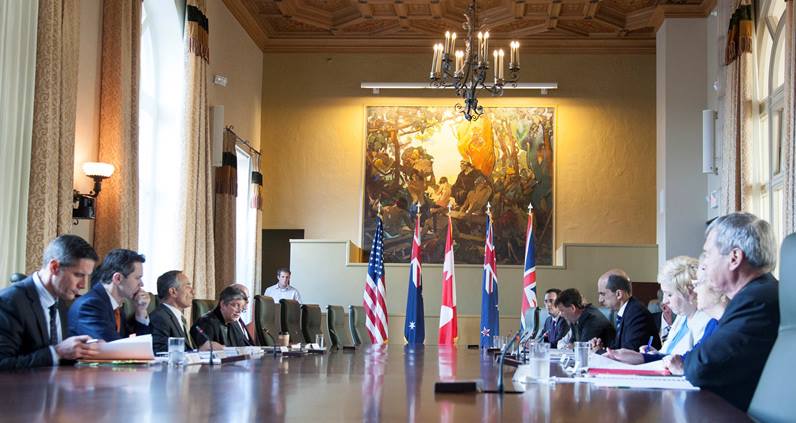Bang on time to complement ASPI’s extended debate about the anglosphere, a senior dialogue of Homeland Security Ministers from the five eyes countries (the US, UK, Canada, Australia and New Zealand) was held this week at the US Naval Postgraduate School in Monterey California. This was the first meeting of such a gathering, described by the US Secretary of Homeland Security Janet Napolitano as an opportunity to discuss closer collaboration on the ‘cybersecurity of critical infrastructure, countering violent extremism, and data exchange initiatives’. She added:
While each topic holds its own challenges, they all require close collaboration in order to build our collective ability to identify and mitigate threats that transcend our physical borders. … I see the Five Country Ministerial as a singular forum in which cross-cutting issues will inform discussions on how our five countries can collectively achieve the optimal balance of mobility and security.
Australia’s Home Affairs Minister Jason Clare attending the meeting and in a rather low key media release said that he had agreed in a meeting last year with Napolitano to establish the forum. This joins a regular five eyes meeting of Attorneys General, the last of which was held in New Zealand last May.
While many might wish it to be otherwise, the fact remains that the Anglosphere (call it the five eyes relationship if you prefer) simply keeps on delivering useful practical security cooperation between its members and their closer friends. It’s an association built on real delivery, rather than an artificial construct—like a concert of Asia would be—which sounds great in theory but struggles to grain traction in reality.
Napolitano’s opening remarks at Monterey also offered an interesting insight into how a five-eyes construct has the capacity to shape the international behavior of a larger number of actors:
Working closely together, we have a unique opportunity and capacity to develop common international standards and approaches to security issues, and promote these among other foreign partners.
There’s more substance to this than just the niceties of opening a meeting. By developing shared policy approaches, the five-eyes countries will have a disproportionate impact on the behaviors of other states in international discussions on cyber security and other non-defence security issues. This certainly has the potential to shape outcomes at gatherings such as the Seoul Conference on Cyberspace, which aims to build international political momentum for collaboration on cyber-security. Thus does one of the newest challenges in security—how to build an international framework for cyber collaboration—benefit from one of the oldest strategic constructs, the Anglosphere.
Peter Jennings is executive director of the Australian Strategic Policy Institute. Image courtesy of the Department of Homeland Security.


